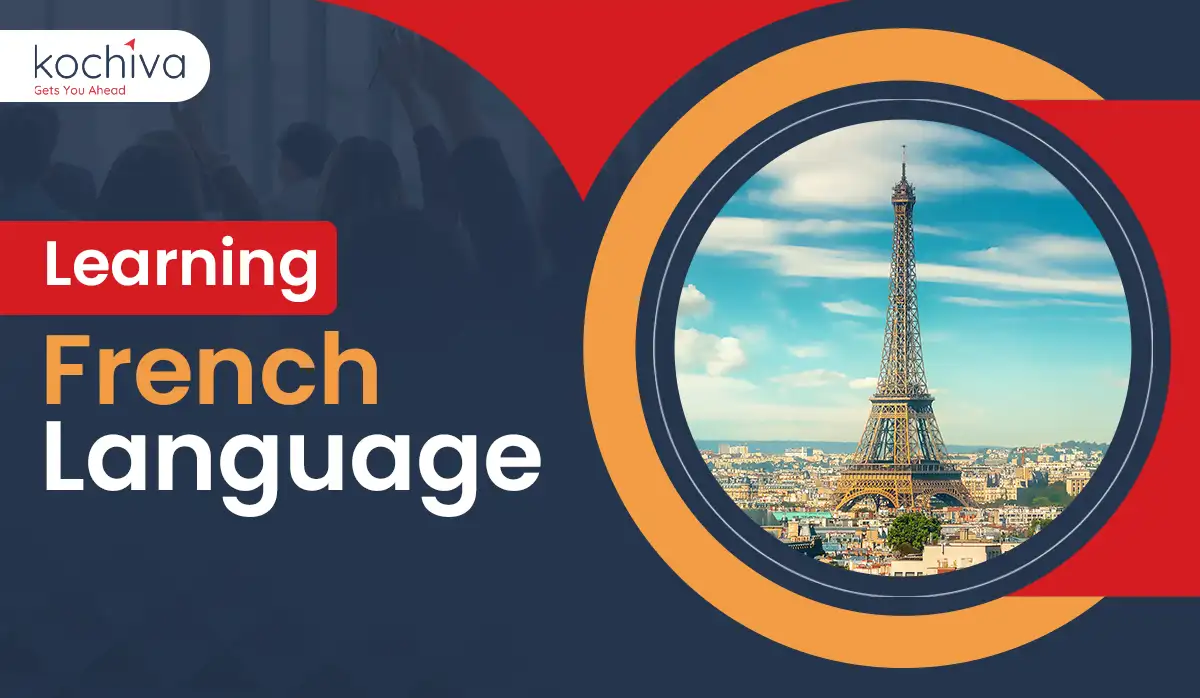Learning French Language - The complete Information
Introduction
The French language has a complex and rich history. It is a Romance language, it evolved from vulgar Latin which was essentially the spoken language of the Roman Empire. At the beginning of the 21st Century, French was the official language of 25 countries. The evolution of the modern French language is fascinating. The expansion of the language to many parts of Europe and the world led to the establishment of France as a great colonial power.
According to the 2022 report of the Organisation Internationale de la Francophonie (OIF), 450 million people speak French.
Characteristics of the language are:
- French grammar is simpler than Latin. Nouns are allowed for the case.
- Masculine and Feminine gender are distinguished. They are usually marked not in the noun but in the accompanying article or adjective.
- Plural marking in French is also distinguished.
- French has verb forms for indicative, subjunctive, and imperative moods; Preterite, imperfect, present, future, and conditional, and a variety of perfect progressive tenses; and passive reflective constructions.
Table of contents
Learning French Language
Benefits of Learning French Language
French Lessons for Beginners: A step-by-step guide
Understand the Levels During learning French Language
Examination of the French Language
How to Register for the TEF Exam in Canada
French Courses in India
Learning French Language for Visa
How can I learn French by Myself?
Benefits of Learning French Language
French learning can bring a multitude of benefits, both personal and professional. Key advantages of Learning French are:
Global Communication:
There are millions of people in the world who speak French. It’s an official language in over 29 countries across multiple continents, including France, Canada, Belgium, Switzerland, and many countries in Africa. Learning French can open doors for communication and cultural exchange with people from diverse backgrounds.
Career Opportunities:
French is one of the official languages of many international organizations, including the United Nations, UNESCO, NATO, and the International Red Cross. Proficiency in French can enhance career opportunities in fields such as diplomacy, international relations, business, tourism, translation, and teaching.
Cultural Enrichment:
We all, once in our lifetime, have dreamt of exploring French museums, reading the literature by authors like Victor Hugo, Marcel Proust, and Albert Camus, and simultaneously sipping the exquisite hot chocolate of Angelina Cafe. Or occasionally while holding a glass of Champagne, discussing French history in an art gallery. Well, learning the language can make your dreams come true and can bring you closer to the culture and lifestyle that you once aspired for!
Enhanced Cognitive Skills:
Studies have shown that learning a second language, such as French, can improve cognitive abilities, such as problem-solving, multitasking, and memory. Some experts believe that learning French can also delay the onset of age-related cognitive decline and reduce the risk of neurodegenerative diseases like Alzheimer’s.
Travel Opportunities:
France is one of the world’s top tourist destinations, renowned for its landmarks, museums, cuisine, and picturesque landscapes. Knowing French can enhance the travel experience by facilitating communication with locals and gaining deeper insights into the culture and history of French-speaking regions.
Academic Pursuits:
Proficiency in French can open doors for academic opportunities, such as studying abroad in French-speaking countries, pursuing degrees in fields related to French language and literature, and participating in exchange programs.
Culinary Expert:
If you are someone who wants to learn French cooking and culinary skills, learning French is a necessity. The language will bring meaning and story to your food. Soon after learning French, you will become a perfect chef or baker.
Personal Enrichment:
Learning French can be a rewarding and fulfilling personal pursuit. It provides opportunities for self-expression, creativity, and lifelong learning. It can also foster connections with speakers of French, both locally and globally, leading to lasting friendships and cultural exchange.
Career in Translation and its Scope:
If you are interested in Translation, study French in detail. Translating books, documents, scripts, websites, etc. from French to English or vice versa is a lucrative career option. With experience, you can earn Rs. 30,000–60,000 per month as a freelance French translator. You can also find jobs in MNCs, embassies, hotels, and more. And if you know English, your chance of employability increases.
Jobs in MNCs:
Learning French can be beneficial for you if you decide to work in multinationals like L’Oreal, Renault, Auchan, Cartier, Chanel, and many more.
Opportunities in the Fashion Industry:
We all are aware that the city of Paris is the flag-bearer of modern-day fashion. So if you are a fashion and design enthusiast, and aspire to live in Paris, you must learn French to establish yourself in the industry, the networking will become easy for you.
Experience Live Classes
Request a DemoFrench Lessons for Beginners: A step-by-step guide
Here is a guide to Learning French for beginners, so buck up and start! You must keep in mind-
1. Pronunciations:
French words are not pronounced in the manner they are spelled. The French pronunciations include silent letters, clusters of vowels, and sounds. But practice makes everybody perfect! The pronunciations can be perfected by reading your text aloud or by watching French movies and TV shows. Some of the basic pronunciation rules that a beginner must keep in mind are as follows-
- All vowels in a word need to be pronounced: There are about 13 to 15 vowel sounds in French. To be fluent, one must learn these sounds.
- A certain part of the word needs to be stressed: Especially on the last pronounced syllable. If you are teaching yourself, take the time to practice stressing the right syllable,
- Certain words end with a sound called a “liaison”: If a word ends with a consonant and the next begins with a vowel or a silent “h,” then the final consonant of the first word joins the following vowel.
2. French Vocabulary:
Interestingly, French words and phrases are very similar to the ones that you already know in English. Several English and French words come from traditional Latin, therefore some phrases and words are prevalent in both languages. Moreover, some Greek-derived words have made their way to English and French. In short, the French language has Greek and Latin words and you won’t face any trouble deciphering them. For example, When you see the French words artiste, académique, or génération, you’ll probably have no trouble guessing their English equivalents.
3. Start conversing in the French language:
You must be finding this act of speaking a language without learning it thoroughly daunting. But it is the best way to learn. You can converse with your French tutor, or French-speaking language exchange partner.
Start your conversation with a greeting, like:
- Bonjour (= Hello during the day),
- Coucou ! (= Hi! for friends, it’s informal and cute.)
To continue the conversation
- Ça va ? (= How are you doing?)
- Ça va, et toi? (= I’m fine, and you?)
Ça va” is both a question and an answer! Notice how you can use et toi ? (= and you? What about you?) to ask any question back. It can help a conversation flow better!
Next questions tend to be simple and common, such as:
- Quoi de neuf ? = What’s new? What’s up?
- Tu fais quoi dans la vie ? = What do you do for a living?
- Tu viens d’où ? = Where are you from?
- Comment tu t’appelles ? = What’s your name?
- C’est quoi ton nom ? = What’s your name? (informal, everyday spoken French)
Prepare your own answers to that basic French conversation! Like:
- Je suis prof. = I’m a teacher.
- Je suis retraitée. = I’m retired….
- Je suis américaine. = I’m an American (woman)
- Je suis australien. = I’m an Australian (man)
- Je viens de Pologne. = I’m from Poland…
- Je m’appelle [Géraldine]. = My name is [Géraldine]. / I’m [Géraldine].
Beyond these first basic questions, you can go with slightly more complex ones:
- Vous partez pour les vacances? = Are you going somewhere, for the holidays?
- Tu fais quoi ce week-end ? = What are you doing this weekend?
How can you answer?
Well, to talk about your near future: use aller or le futur proche = aller + infinitif.
- Je vais à la plage. = I’m going to the beach.
- Je vais voir de la famille. = I’m going to see my family.
You will be able to perfect these conversations once you take up the French learning course.
4. Make a list of Pronouns, Verbs, and Nouns:
- elles — they (feminine)
- elle — she
- ils — they (masculine)
- je — I
- tu — you (informal)
- il — he
- nous — we
- vous — you (plural/formal)
- on — we (informal)
- ils — they (masculine)
Such charts will help you clear the basic concepts surrounding the French language and it will make your learning easy.
You should also look at some of the great conversation starters!
5. Use Language Learning Apps:
Apps are fun and easy to access. It will make your journey of learning French language very interesting. It will also ensure regular practice. The biggest benefit of using an app is that you can learn anywhere and at any time. Some of the best apps are Babbel, Memrise, Rosetta Stone, etc. If you have enrolled yourself in Online French learning classes, you must grasp common French noun conjugations. For example,
6. “Books are a man’s best Friend”
Below is a small curated list of books that can help you Learn French in a self-paced manner:
- The French for Dummies All-in-One Book: This book includes a CD. The book consists of basic vocabularies and practical dialogue exercises, which can be very helpful for those who trying to teach themselves.
- Ultimate French Review and Practice: A Book by David Stillman and Ronny Gordon. The French explanations here are nuanced. It can prove to be a rich learning explanation for the reader.
- Easy French Step-By-Step: The author of the book is Myrna Bell Rochester. It’s a best-seller listed on Amazon. It’s a quick introduction to French and can be picked up by someone who wants to learn French instantly since it fulfills immediate and basic needs.
- Grammaire and Dialogues – Niveau Grand Debutant: A book by Odile Grand-Clemente, it has great real-time dialogues, that can also help you professionally while conversing in French. It’s the best book to pick up if you have a tutor or teacher to guide you. It can also help you prepare for DELF and DALF exams.
- Vocabulaire en Dialogues A1-A2: This book is written by Evelin Sirejols. It is a good book for learning essential and basic French. The chapters have topics like clothes, food, sports, shopping, weather, etc. This is specially designed for beginner levels of Learning French such as A1 and A2
Some of the other books that you can use are Exercises by French Phonics by Francis W. Nachtman, Discovering French by Valette Valette, Communication Progressive du Francais A2 and B1 by Clair Miquel, etc.
7. Fall in love with the French Language
It is not very difficult to fall in love with the French Language because it is also the language of love. The entire learning experience should be serene. French is also one of the most ancient languages, so try connecting the historical scenario with the language and phrases. Try to grasp the emotion and the intent behind the expressions.
A language is also learned by the heart so feel the emotions while conversing in French and the journey of learning will become simple.
Understand the Levels During learning French Language
1. A1 Level
A1 Level French is the first level as per the Common European Framework of Reference for Languages (CEFR). It is commonly known as “the discovery stage”. At the A1 level of French learning, you have limited or no prior knowledge of French.
Achieving the A1 Level of French has several benefits-
- The student will be able to learn the language’s fundamentals, including conjugations, auxiliaries, numbers, etc.,
- The learner will learn how to express themselves in brief words on intimate subjects like their families
- He/she will begin communicating with others by posing and responding to basic questions.
2. A2 Level
The A2 level French is an elementary stage as per the Common European Framework of Reference for Languages (CEFR). It is widely recognized and used to assess the language proficiency of a learner.
Achieving French level A2 has several benefits-
- It enables learners to engage in basic conversations with native speakers,
- Navigate common situations during travel,
- Gain a deeper understanding of French culture.
3. B1 Level
B1 level of the French language is the third level in the Common European Framework of References (CEFR). Level B1 is also known as the ‘Threshold’ or ‘Breakthrough’ stage. Once you clear the B1 French exam, you enter the intermediate level of French which makes you an “independent speaker”.
Achieving French level B1 has several benefits-
- A student at the B1 level can write a clear and concise text about a topic
- A learner can comprehend the majority of topics at jobs, schools, or hobbies.
Please note that the clearance of the B1 French level is the minimum requirement to apply for a residence permit in France.
4. B2 Level
The B2 level of French learning is the fourth level in the Common European Framework of References (CEFR). It is also known as the ‘Upper Intermediary’ or ‘Vantage’ stage.
Achieving French level B2 has several benefits-
- A Learner can understand the fundamental idea of a complex text, or technical piece related to their field.
- They can communicate with a degree of fluency and spontaneity without too much strain.
5. C1 Level
The C1 level of Learning French is the fifth level in the Common European Framework of References (CEFR). It is also known as the stage of “Advanced French speaker”/
Achieving French level C1 has several benefits-
- At the C1 level, the learner will become capable of speaking in French in professional, academic, and social spaces.
- The student will gain control over the articulation of speech and presentation in the French language.
6. C2 Level
C2 level is the highest level of French learning. If you attain this level then you become proficient in French.
Achieving French level C2 has several benefits:
- The student should be able to read, understand, and write any kind of document which includes academic texts.
- They will be able to express themselves as well as a native speaker.
Examination of the French Language
Before we learn about the French language courses in detail, examinations are a significant aspect of learning a foreign language. As per the above understanding of how to learn the French Language, it is important to understand the scope, eligibility, and difficulty levels of the French Proficiency Test. Some of the most common French proficiency tests include:
- TEF (Test d’Évaluation de Français) Canada- TEF Canada was created in 1998 by the French Language Centre of the CCI Paris Ile-de-France, the TEF is an international Benchmark test that measures the language skills of the learner.
TEF Canada exam is officially accepted and recognized by:
- The Ministry of Higher Education, Research and Innovation
- Department of Immigration, Refugees and Citizenship of Canada
- The French Ministry of the Interior
- The French Ministry of Education
- Swiss State Secretariat for Migration
- Quebec Ministry of Education, Francisation and Integration
How to Prepare for the TEF Canada Exam?
- Practice Online: Try getting familiar with the section on oral comprehension and expression of TEF (in French)
- Sample Paper: More emphasis should be laid on the fact that solving sample papers and continuous practice can tremendously help you with your preparations.
It usually takes up to 10-12 months of preparation to clear TEF Canada. If you are a self-taught learner, you will take approximately 8-9 months of training. Start by reading for 3-6 hours every day. Devote more time on weekends to efficiently prepare.
TEF Canada Exam Fees, Syllabus & More
The TEF exam is classified into five modules that a candidate has to clear with a minimum of 7 points in the test. The test’s time and questions are as follows:
- Listening– 60 MCQs in 40 minutes
- Reading– 50 MCQs in 60 minutes
- Speaking– 2 different exercises in 15 minutes
- Writing– 2 topics in 60 minutes
- Vocabulary and syntax– 40 MCQs in 40 minutes
How to Register for the TEF Exam in Canada
Candidates above 16 years of age may apply for the TEF Canada Exam. Take a look at the step-by-step guide to registering for the TEF exam:
- Check the official website of the TEF Exam
- Register for the exam
- Upload photographs with a white background
- Upload the first and last page of your passport
- Submit the NEFT reference payment number
- On submission, students will have 5 days to register for the seat, or it might be offered to the next person on the waiting list
Exam Fees
In India, TEF exam fees cost $440 and must be made at the time of registration. In case of rescheduling or cancellation before the registration deadline, a non-refundable $75 will be charged. Past the registration deadline, no rescheduling or refund will be processed. Payment can be made in the form of cash, cheque, online, visa, or MasterCard.
DELF(Diplôme d’Etudes en Langue Française) and DALF (Diplôme Approfondi de Langue Française) Exam
DELF is an official diploma awarded by the French Ministry of Education to certify foreign candidates that they have reached a certain level of French Proficiency. These certifications have lifelong validity.
There are 6 independent diplomas in the abovementioned courses, corresponding to the proficiency levels of the Common European Framework of Reference for Languages (CEFRL). At each level, 4 skills are evaluated i.e. speaking, reading, listening, and writing.
DELF is for the age group of 18-17. Older adults usually take up these jobs if they are serving in their nation’s diplomatic or expat services. Some also take up this test to attain a certain level of certification in French to sustain and grow in their respective carers.
DALF targets students of universities and young professionals. It is commendable to clear the DALF examination. It certifies that you are proficient in the French Language.
What are the different levels of French Certification?
DELF A1: Breakthrough or beginner (registration fee INR 8620+ GST)
DELF A2: Waystage or elementary (registration fee INR 8620+ GST)
DELF B1: Threshold or intermediate (registration fee INR 10,200+ GST)
DELF B2: Vantage or upper intermediate(registration fee INR 10,200+ GST)
DALF C1: Effective Operational Proficiency or Advanced(registration fee INR 11,300+ GST)
DALF C2: Mastery or proficiency(registration fee INR 11,300+ GST)
TCF (Test de Connaissance du Français)
This test evaluates the French language proficiency of non-native speakers. It is often used for academic purposes, immigration, or professional goals. The French Ministry of Education administers the TCF. TCF is an important yardstick for French language learning.
In general, the TCF grades and ranks candidates at one of the six levels (A1, A2, B1, B2, C1 or C2) on a scale defined by the Council of Europe (Common European Framework of Reference for Languages). TCF grade results are reliable measurements for determining proficiency. Each candidate is awarded a certificate which is valid for two years.
Format for TCF
It is a multiple-choice question test. It covers command of French grammar, reading comprehension, and listening comprehension.
The time distribution is as follows:
- Listening Comprehension (29 items – 25 min)
- Reading Comprehension (29 items – 45 min)
- Command of lexical and grammatical structures (18 items – 15 min)
It covers a total of 76 items that are imperative for Learning French.
The exam fee is INR 12,000+ GST.
Similarly, TCF Canada is for emigrating to Canada or for applying for Canadian citizenship.
French Courses in India
Why Learn French in India?
- It is important to learn French if you are pursuing International Relations, Diplomatic or Expats services.
- If you love traveling, Learning French can be a boon for you!
- If you are a language enthusiast! Then translation is a great choice for you. Whether you want to translate text or become an interpreter it’s a brilliant career path for you.
- Did you know that French is also an official language in modern-day Pondicherry? The city still has a French-speaking population about 5,500 of the 6,500 French citizens registered in South India reside in Pondicherry.
India has a variety of offline and online French courses. But how do you learn French in India? Will such courses help us in clearing the French language exams are not? Let’s analyze that.
How to Learn French?
In India French classes online are becoming very popular,The best ways to learn French online:
- Language Learning Apps: Review popular language learning apps such as Duolingo, Babbel, and Rosetta Stone, offering interactive French courses accessible to learners across India.
- Online Courses: Explore MOOC platforms like Kochiva, Coursera, edX, and Udemy, offering French language courses taught by experienced instructors.
- Virtual Tutoring: Discuss the benefits of virtual tutoring platforms that connect learners with qualified French tutors for personalized French classes.
- Online Communities and Forums: Highlight online forums and communities where learners can connect with fellow enthusiasts, exchange resources, and seek advice on learning French.
Kochiva offers one of the best online French classes in India. Now learn French online with Kochiva Institute. Kochiva is an exquisite platform for upgrading your foreign language learning skills. It provides industry-oriented Live Online courses in the field of Foreign Languages along with placement assistance.
The online French Certification course is their most popular course. It provides assistance to help the learners in improving their employability and personal growth.
Kochiva provides the best way to learn French online. It is a renowned institution and has competent C1/C2 level trainers. The batches of the classes are small, including 8-12 students. They also assist with the preparation for exams like DELF, DALF, TCF, etc. which are valid for life. The world-class and globally competitive faculty especially focuses on the French language’s difficult pronunciations and grammar rules.
French Language Course Structure:
- Beginners Level : Includes A1 & A2 (50 hours each)
- Intermediate Level : Includes B1 & B2 (80 hours each)
- Advanced Level : Includes C1 & C2 (80 hours each)
Kochiva teaches you about the learning French language Online with International certification in the right way.
Please Note the curriculum is specifically designed as per the difficulty levels of Learning French.
French Language curriculum includes:
For A1, A2, B1 and B2 courses
- Reading Comprehension: Students are provided with a customized Kochiva’s pronunciation guide which will enable them to read simple texts.
- Listening Comprehension: Students will be able to grasp French Pronunciations of numbers, alphabets, names, and words through a number of oral exercises and repetitive practice.
- Speaking Competent: By the end of the course, students will be capable enough to pull off a self-explanatory presentation in, ask questions, and daily dialogues in French.
- Focus on Grammar Rules: The faculty will ensure that the learners are through with the gender, noun, pronoun, and other important Grammar conjugations.
- Vocabulary: During conversation, students will be able to build their vocabularies as well.
- Culture and Civilisation: While teaching the teachers also make sure that students become well-versed with the French cultural nuances.
For C1 and C2 courses
- Enhanced Written Expressions: At this stage of learning, you will be able to write letters. You will become hands-on with the writing practice. Thorough knowledge regarding the history and culture of the French language and its place of origin i.e. France will be imparted.
- Speak fluently: You will be able to use colloquial expressions and well-structured sentences.
- Proficient and Methodic listening: You will be able to understand fast conversations, podcasts, etc. Slangs and Idioms will become easy to grasp.
- Reading with Perfection: You will have a great command of the language. You will be instructed to practice reading novels, magazines, and other cultural-specific texts which will further improve your reading and simultaneous comprehension.
- Speak like a Native: you will be able to summarise spontaneously and fluently any accounts and information from diverse written texts and spoken conversations.
Kochiva: Learn to speak French Confidently
If you desire a classroom experience, then Kochiva also offers offline classes at its Gurgaon center. It’s the finest French Language course in Gurgaon.
With Kochiva, learn to speak French efficiently and accurately!
Duration of The course: 300+ Hours with Placement Assistance
Batch Size: 9-12 hours
E-Mail Address: info@kochiva.com
Contact Number: 9872334466
Website: https://kochiva.com/language-course/learn-french-language-online/
Learning French Language for Visa
If you are planning to migrate to France you must take French language lessons. The French people love their language and if you know their language, it creates a wonderful impression on them. So keep in mind that if you plan to live there for some time while applying for a Visa, learn French simultaneously.
In the case of a Student Visa:
For a student visa, you must enroll in an intensive course for a period longer than 3 months.
For Long Stays Visa (Visa de Long Séjour): For courses lasting longer than 90 days, students need to apply for a visa.
To acquire a residential visa, the B1 Level of French language proficiency is a must.
How can I learn French by Myself?
With the advent of technology, our learning has no bounds. Some of the most innovative ways to learn French language on your own are:
Set Clear Goals:
Define why you want to learn French and what level of proficiency you aim to achieve. Whether it’s for travel, work, personal interest, or academic purposes, having specific goals will help you stay motivated and focused.
Choose the Right Resources:
There are numerous resources available for learning French independently. Consider using a combination of textbooks, online courses, mobile apps, podcasts, YouTube channels, and language learning websites. Some popular resources include Duolingo, Babbel, Rosetta Stone, FluentU, and Lingodeer.
Work on Listening and Comprehension:
Practice listening to spoken French regularly to improve your listening comprehension skills. Listen to podcasts, audiobooks, radio programs, and online videos in French. Focus on understanding the context, main ideas, and key details of the audio content.
Develop Reading and Writing Skills:
Read French texts of varying difficulty levels, including books, articles, and short stories. Pay attention to vocabulary usage, sentence structure, and writing style. Practice writing in French by keeping a journal, writing essays, or participating in online forums or language exchange platforms.
Stay Consistent and Persistent:
Learning a language takes time, effort, and patience. Establish a regular study routine and commit to practicing French consistently, even if it’s just for a short amount of time each day. Celebrate your progress along the way and don’t get discouraged by setbacks or challenges.
Seek Feedback and Correction:
Don’t be afraid to make mistakes when practicing French. Seek feedback and correction from native speakers, language tutors, or online communities to improve your language skills. Embrace constructive criticism as an opportunity for growth and learning.
Track Your Progress:
Keep track of your language learning progress by setting milestones, tracking your vocabulary expansion, and monitoring your improvement in listening, speaking, reading, and writing skills. Reflect on your achievements and areas for improvement regularly to adjust your learning strategies accordingly.
Use VR technology:
Start by using a VR language learning environment. Start by finding or creating a virtual reality environment designed specifically for language learning. This environment could resemble a French-speaking city or town, complete with streets, shops, and landmarks.
Realistic Scenarios:
Create immersive scenarios within the VR environment that simulate real-life situations where you would use French. For example, you could practice ordering food at a virtual café, asking for directions on the streets, or engaging in conversations with virtual characters.
By following these steps and staying dedicated to your learning goals, you can effectively learn French on your own and become proficient in the language over time. Remember to enjoy the journey and celebrate your achievements along the way!
FAQ
Q- Is it difficult to learn French?
Answer – It’s time we bust this myth that learning French is difficult. The French language learning is easy. Let’s look at how. It has the same alphabet as English, so if you know English, it is straightforward for you to pick up the basics of French. Furthermore, English and French are influenced by Latin. Both languages have a few common grammatical features, such as definite and indefinite articles, verb tenses, and pronouns. Though there are differences, the basic framework is similar.
Q – How long does it take you to learn French?
Answer – There cannot be a fixed time period in which you can perfect a language. The sky is the limit! The more you practice the better you get. So be dedicated, follow the instructions of your tutor and more importantly be patient. Take your French lessons regularly. Focus on building a solid foundation of the French language. Enjoy the process of learning, and certainly one day you will be proud of your spoken French skills!
Conclusion
Learning French can be an exquisite experience. It can open several doors of opportunity for you. Through a combination of dedication, immersion, and strategic learning methods, individuals can unlock the doors to a world of linguistic and cultural enrichment. From setting clear goals to embracing immersive experiences and seeking continual improvement, the path to mastering French is as diverse as it is fulfilling.
All in all, As learners navigate grammar intricacies, expand their vocabulary, and hone their communication skills, they not only gain linguistic proficiency but also develop a deeper appreciation for the vibrant tapestry of French-speaking cultures around the globe.






